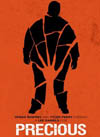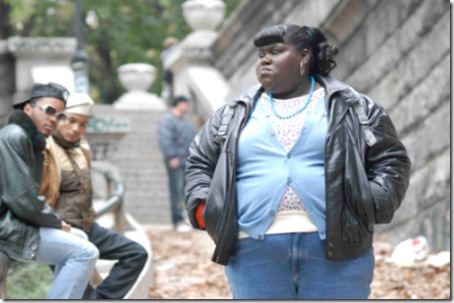500 Days of Summer
Away We Go
Bright Star
The
Curious Case of Benjamin Button
Gran Torino
Harry Potter and the Half Blood Prince
The Hurt Locker
The Informant!
Julie & Julia
Milk
Precious
The Reader
A Serious Man
Film Reviews from 2008
Film
Reviews from 2007
Film Reviews
from 2006
Precious
When we first meet the title character, “Precious” Claireece Jones, she is an obese 16 year old, withdrawn young woman, and pregnant with her second child. Both this child and her first were fathered by Precious’ own father, Hank. Precious lives in a small Harlem apartment with her abusive mother, Mary. At school, the silent Precious is frequently harassed by the other students. When her principal discovers Precious is pregnant for the second time, she expels her. However, she refers Precious to an alternative school program, “Each One Teach One,” designed for students who do not learn in a regular school environment. At first, Precious’ only escape from her hellish existence is through an active fantasy life. She imagines herself as a Hollywood star or famous model, with throngs of autograph-seeking fans. Gradually, she begins to open up in her new school, with a small class which forms community and a caring teacher. Precious begins to find her voice by sharing her story and journaling. Precious begins to love herself and see herself as capable of coping with life’s considerable challenges. The encouragement Precious receives in school stands in stark contrast from the hateful messages she receives at home from Mary. Mary wants Precious to drop out of school, so she can do the cooking and housekeeping at home, telling her that she will never amount to anything.
Much of the success of the film is due to its fine actors, especially newcomer Gabourey Siudibe, as Precious, and Mo’nique (an almost certain Oscar nominee) as Mary. Gabourey brings out the personality buried deep inside Precious. It would be easy for Mary to be played as simply a monstrous mother. But Mo’nique’s great performance allows us to see deeper inside her. In a chilling scene near the end of the film, Mary talks about her feelings for Precious and her boyfriend, Hank, to a case worker (an unrecognizably plain Mariah Carey). It’s a great scene, both horrifying and revelatory. Be forewarned: the home scenes in Precious are difficult to watch and hear (there is a great deal of profanity). But the scenes are authentic and necessary to understand the obstacles that Precious successfully overcomes. There’s no fairy-tale happy ending here. But there is realistic hope at the end for Precious and her two children. Finding her own voice and overcoming tremendous obstacles, Precious has found courage and hope in the midst of self-loathing and despair. That’s a great victory. Tom Condon, OP
|
MPAA Rating: R for child abuse including sexual assault, and pervasive language. |



 The actual title of this fine new movie is one of the most awkward I’ve ever heard: Precious: Based on the Novel Push by Sapphire. Apparently a forgettable movie named Push opened earlier this year and stole the novel’s title. Despite the awkwardness of the title, Precious is anything but forgettable. I imagine anyone who sees it will remember this tough, but ultimately hopeful film, for a long time. It’s certainly one of the bright spots in a mediocre movie year.
The actual title of this fine new movie is one of the most awkward I’ve ever heard: Precious: Based on the Novel Push by Sapphire. Apparently a forgettable movie named Push opened earlier this year and stole the novel’s title. Despite the awkwardness of the title, Precious is anything but forgettable. I imagine anyone who sees it will remember this tough, but ultimately hopeful film, for a long time. It’s certainly one of the bright spots in a mediocre movie year. The plot of Precious is familiar: A young person finds his or her way out of terrible, poor existence through education and a caring teacher. Actually one scene, in which the class goes to a museum, is reminiscent of a similar scene in the 1960’s Sidney Poitier classic, To Sir with Love. Even though there is a common theme, Precious is so well written by Geoffrey Fletcher, adapting the 1996 novel by Sapphire, and directed by Lee Daniels, that it is unique. Precious is also different in that it is told from the perspective of the student, not the teacher.
The plot of Precious is familiar: A young person finds his or her way out of terrible, poor existence through education and a caring teacher. Actually one scene, in which the class goes to a museum, is reminiscent of a similar scene in the 1960’s Sidney Poitier classic, To Sir with Love. Even though there is a common theme, Precious is so well written by Geoffrey Fletcher, adapting the 1996 novel by Sapphire, and directed by Lee Daniels, that it is unique. Precious is also different in that it is told from the perspective of the student, not the teacher.